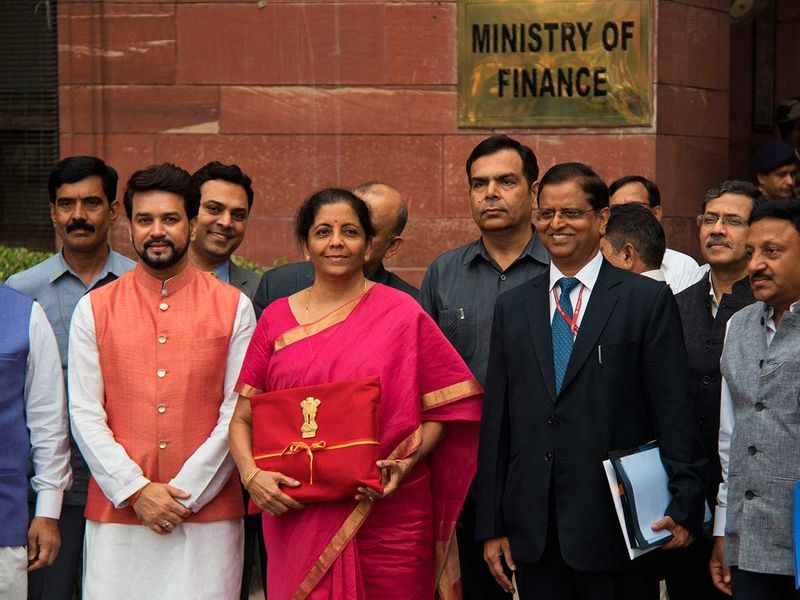
Dubai: The Indian Finance Ministry introduced the Indian Budget for 2020-2021 on February 1, with new provisions for Non-Resident Indians (NRIs), raising concerns among Indian residents of the UAE.
The trigger was a line in the proposed circular issued by the Finance Ministry, which stated: “An Indian citizen who is not liable to tax in any other country or territory shall be deemed to be resident in India.”
Moreover, the ruling Bharatiya Janata Party (BJP) government’s decision to change the number of days required to maintain one's NRI status has also caused confusion.
The extension of days away
The new addition to the budget for 2020-2021 requires people to spend 240 days outside India, as opposed to the earlier 182, in order to confirm their NRI status.
Dubai-based homemaker Monisha Krishana said she did not have any concerns about the tax regarding the income of an NRI resident in a country — but said that the change in number of days does affect people who travel to India often.
The 45-year-old said: “Initially it was bewildering what the government wanted to do. There are people who have to travel to India frequently. I know someone who goes to India for long periods of time. She lives in Dubai but travels for many months because she has to take care of her sick parents. They need to clarify these new rules further.”
Dubai-based private wealth manager Jashank Pohani has a similar concern.
He told Gulf News: “An Indian now has to stay abroad for 240 days, as against 182 previously to be categorised as an NRI. This rule will be detrimental for NRIs that spend more than four to five months in India and have income in Dubai. They will either have to cut short their stay in India or pay taxes on their global income in India.”

They will either have to cut short their stay in India or pay taxes on their global income in India.
Shalini Chadha, director at a UAE-based bank, told Gulf News: “I have property in India. The new extension of days mentioned in the budget is still not clear. I don’t know how that will impact me, and how often I go back home.”
But for people with businesses or who have other needs for travelling back home, this new rule requires clarification.
Cause for concern
Kavana Rao, a homemaker in Dubai, runs a small playschool franchise in India.
The change in the earlier 182 days specified by the government is a cause for concern for the resident.
She told Gulf News: “I have to go to India for work, as well as to meet family as they are old. We never had to calculate the days we spend away from Dubai but now we will have to.

We never had to calculate the days we spend away from Dubai but now we will have to.
“I have to visit India for months, and I usually go for a minimum of three to four months in the year. Now I will have to calculate how many days I spend in the UAE, and how many days I spend in India. I prefer the old rule.”
Health coach and yoga instructor, Sunita Maheshwari said: "The global economy makes a difference. It seems like the NRIs were not consulted before this proposal was made. They have contributed a lot by sending money back home.
"I know a lot of people who go back to India because their parents are old and sick, and they need to go to India for a long period of time. This new policy will affect them greatly."
Consultant, Shrutika Mathur said that the finance minister needs to clarify the subclasses in such a case.
The 32-year old said: “The way I understand it, if I go back to India say in 200 days, I will not only be taxed for the entire financial year, but I will also be taxed for 200 days of my salary I earn in Dubai? So how does this really impact me?”
Many unanswered questions
Dubai resident Madhav Goel had a lot of concerns regarding the new budget presented by Indian finance minister Nirmala Sitharaman.
He said: “There was no clarity provided in the budget speech. The were no clarifications made by the Finance Minister that there would be no tax on the income of an NRI, living in countries like the UAE, Saudi Arabia and more.
“There are clarifications by finance companies that there is a treaty between India and the UAE, which might prevent this.”
India has double-taxation avoidance treaties, which means income generated in one country will not be subject to a tax in the other.
However, the 35-year-old said that the minister herself did not come out and explain these rules.
Goel, the group head of an Abu Dhabi-based company, said that the increase of days for NRIs to be away from India, from 182 to 240 is another cause for concern.
He said: “This leaves very little time for people to be back in India. I think this is a disadvantage. If I do transfer back to India after three years in the middle of the year, I would have to pay taxes for the whole year. The move is disadvantageous for salaried people, as job opportunities do not come every now and then.
“If a salaried individual has to come back to India, they would have to pay for their savings in UAE or another country, because of spending inadequate days away.”

NRI's not concerned with tax law
Despite the confusion over the budget created yesterday, some NRIs we spoke to were not concerned about the income tax levied for UAE-based Indian residents.
Dubai resident Pranav Kapoor is not worried.
The 52-year-old told Gulf News: “There was a little confusion yesterday about whether the new rule applies to us Indians in the UAE, but it has been clarified that it does not. There was some deal of apprehension that the new provision would apply to everyone, and our income would be taxed.”
The sales director added that the new rule applies to those who travel to different countries without holding a residency visa. He said: “The move does not impact me, but in a way it’s good because it catches those people who float around, and who deliberately evade paying taxes in India.”
The Chairman of the Dubai Textile Merchants Association (Texmas), Mahesh Advani, is confident that NRIs residing in the UAE won’t be taxed on their income.
He said: “There are a lot of Indians who are maintaining their status by travelling. As long as you have an employment visa here, you will not be taxed. The only difference is previously you could stay for 182 days and maintain your NRI status. But now that is not the case.”
Are you an NRI? Do you have concernes regarding the new policy in the Financial budget for the new year? Write to us at readers@gulfnews.com








